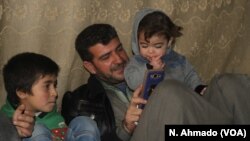Rami Qaddor, an orphanage houseparent in a refugee camp near the Syrian-Turkish border, recalls the day in 2018 when a weak and frightened young boy named Hoger was dropped at the orphanage.
At first, Hoger, 10, did not speak to anyone and was trying to establish trust with those around him, Qaddor said. But later, things changed.
"Every weekend when the other orphans' relatives came to visit the children, no one ever came for Hoger. So, I started taking him to my house so he could be with my wife and children," Qaddor told VOA.
Their bond grew stronger. Qaddor cared for Hoger as if he were one of his own children, and Hoger considered himself part of the family.
Qaddor said no one knew anything about Hoger, until he finally decided to talk about his past.
Yazidi boy
Qaddor discovered that Hoger was a Yazidi from Iraq's Sinjar Mountain, home to many members of the Yazidi religious minority.
Hoger, his mother and three siblings were abducted from Sinjar in 2014 when the Islamic State terror group attacked their village.
Hoger does not recall his full name. He said his father was killed that day by IS militants.
"Hoger came to us eight months ago in a difficult situation. He did not speak to anyone and kept to himself. Now, he is much better. He is playing with other kids, and he loves my wife so much that he calls her 'Mother,' " Qaddor said. "But he still regresses into a bad condition when he talks about what happened to him."
Qaddor said he did not want to tell anyone what the boy had told him because he wanted to protect him. He now recognizes the need for Hoger to find his family.
In August 2014, IS attacked the Yazidi-populated Sinjar Mountain, killing thousands of men and forcing thousands of women and girls into sex slavery. The United Nations estimates that at least 10,000 Yazidis out of 400,000 civilians in the area were killed or abducted during the attack.
About 3,000 Yazidi women and children are still missing, while thousands are living under harsh conditions in refugee camps in Iraq, according to several Yazidi rights groups.
Trip to Idlib
Hoger, his mother and siblings were taken to Syria after his mother was sold as a sex slave. They lived in an IS-controlled camp in Al-Sukhnah town in central Syria. His older brother was taken to a training camp and later fought alongside IS.
Hoger said they were living with an IS leader called Abu Abdullah Al Maghrabi.
In 2016, the camp where Hoger and his mother were staying was hit by an airstrike, killing his mother and two younger siblings.
Left alone, a woman took Hoger as one of her children and fled the IS-controlled Al-Sukhnah to northern Idlib.
Hoger lived with the woman for several months before she dropped him off at the orphanage.
Al-Sukhnah was a major IS stronghold before it was captured by the Russian-backed Syrian government army in August 2017.
Harsh conditions
Qaddor and his family understand the plight of refugees because they were displaced in 2013 from the northern Hama countryside, a province in central Syria. They landed in a refugee camp in Atmeh in northern Syria near the border with Turkey.
Qaddor is unable to return home because the northern Hama countryside lies between rebel-held areas and the Syrian government territories, making it dangerous. Most of the people displaced from central Syria still live in Atmeh camp.
This year, the camp was battered by winter storms and floods that killed and injured several people, mostly children.
"Refugees here are already suffering from a dire situation in the camp with the absence of basic needs. And now, the rain, floods and snow added more suffering to their ordeal," Mohammed al-Abdullah, a Syrian journalist based in Atmeh, told VOA.
Qaddor is barely making ends meet in the camp and is depending on aid from regional NGOs and international organizations.
"I consider Hoger as one of my children," he said. "He is just an innocent child. He should have a better life."






